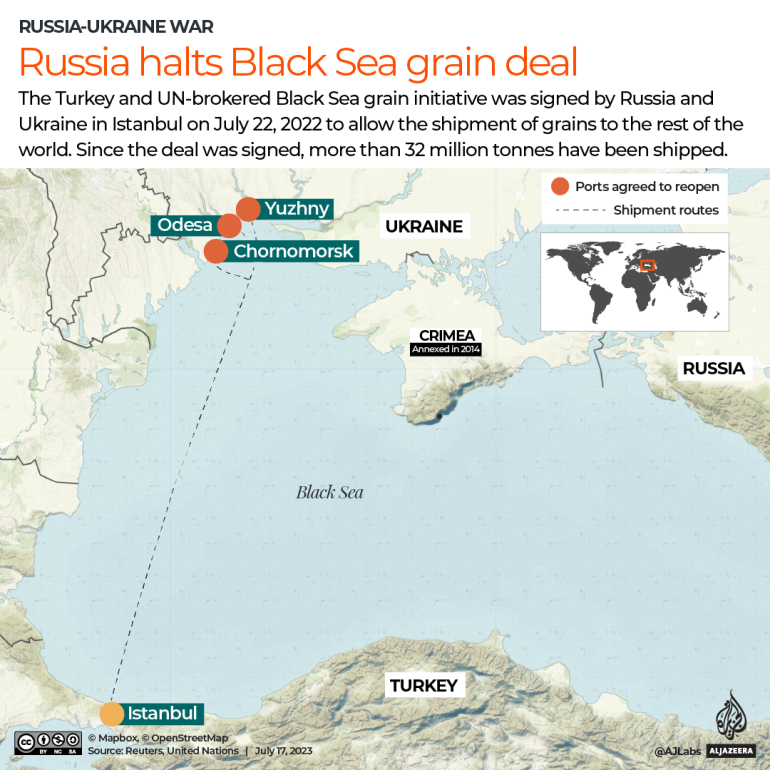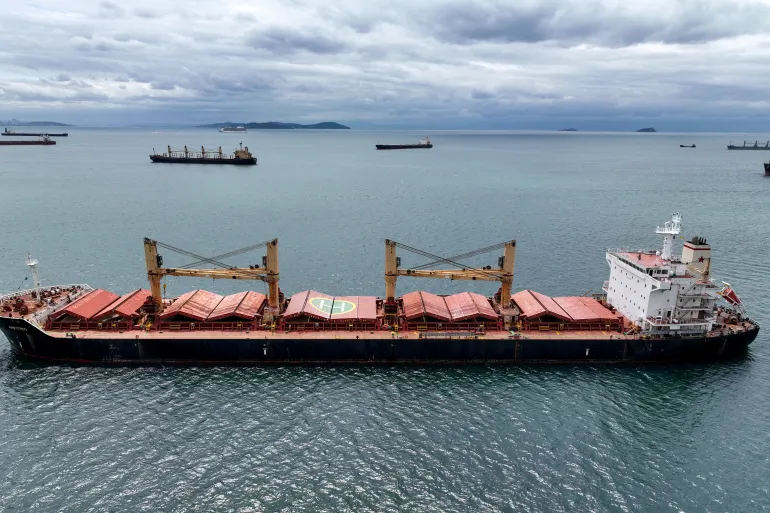As Russia Exits Grain Deal, Which Countries Will Be Affected?
BALKANS AND EASTERN EUROPE, 24 Jul 2023
Hanna Duggal | Al Jazeera - TRANSCEND Media Service
17 Jul 2023 – Almost 33 million metric tonnes of grain were exported since the Black Sea Grain Initiative was brokered a year ago.
Russia has said it will not extend an international deal to allow the safe shipment of Ukrainian grain through its ports in the Black Sea.
The accord, which is set to expire today evening, has been credited with helping curb food prices around the world in the wake of Russia’s invasion of Ukraine last year. The two countries are two of the world’s largest agricultural producers.
Almost 33 million metric tonnes of grain were exported since the Black Sea Grain Initiative was brokered by the United Nations and Turkey a year ago.
The Kremlin said on Monday that Russia would “return” to the deal “immediately” if its demands to improve its own grain and fertiliser exports are met.
What is the Black Sea Grain Initiative?
The Russian invasion of Ukraine in February 2022 sent the world into a global food crisis amid soaring inflation.
Prior to the war, in 2021, Russia and Ukraine were the world’s first and fifth largest exporters of wheat respectively, according to the Observatory of Economic Complexity.

In July 2022, the UN and Turkey arranged a deal that would see Ukraine export grain through the Black Sea. The agreement would allow ships to travel safely from the Ukrainian ports of Yuzhny, Odesa and Chornomorsk to the Bosporus without being attacked.
With it came a separate agreement to facilitate shipments of Russian food and fertiliser. Russia has long complained that parts of the deal relating to these exports have not been implemented.
On October 31, Russia temporarily pulled out of the agreement, citing drone attacks on its Black Sea fleet in Sevastopol. Shortly afterwards, Moscow rejoined the pact for a further 120 days on November 2. In March 2023, it agreed to extend its participation in the deal for another 60 days, a commitment it renewed in May.
How much grain has been transported?
Since the deal was struck, UN data show that about 32.9 million metric tonnes of grain have left the Black Sea.
The majority of grain has been corn and wheat. They accounted for 16.9 million tonnes and 8.91 million tonnes, respectively.
Ukraine is often referred to as the breadbasket of Europe, with more than 55 percent of its land being arable. Post-invasion, it was the eighth-largest producer of corn and the ninth-largest producer of wheat in the 2022-2023 period.
Other food commodities exported over the same period included sunflower meal (1,857,917 tonnes), sunflower oil (1,650,092 tonnes), barley (1,268,298 tonnes) and rapeseed (1,000,859 tonnes).
Where have exports gone?
According to the UN, 45 countries across three continents have received food commodities under the deal.
The average size of shipments leaving the Black Sea is about 32,450 tonnes.
The highest tonnage to date has been exported to China (7.96 million tonnes, or almost 25 percent of the total); followed by Spain (5.98 million tonnes); Turkey (3.24 million); Italy (2.1 million); the Netherlands (1.96 million); and Egypt (1.55 million).
The UN says the deal has helped reverse spiking food prices by more than 20 percent, but Russia says food supplies transported via the grain corridor are not reaching the world’s poorest countries.
Nearly 44 percent of the exports have been shipped to what the UN calls high-income countries.
Where is grain needed the most?
According to the World Food Programme (WFP), pre-war Ukraine produced enough food to feed 400 million people per year. In 2021, almost two-thirds of the UN food agency’s overall grain procurement came from Ukraine.
The UN says the deal allowed the WFP to transport more than 725,000 tonnes of wheat to help people in need in countries hit by wars and extreme weather events.
Ethiopia received more than a third of that (262,759 tonnes), with more than 20 percent going to Yemen (151,000) and 18 percent to Afghanistan (130,869).
In 2022, in monetary terms, Ukraine provided the third-highest amount of the total food procured for the WFP and the most metric tonnes, at 643,189.
Nana Ndeda, humanitarian policy and advocacy lead at Save the Children, said the deal had enabled the stabilisation of global markets and the lowering of food prices in many parts of the world.
“What is likely to happen now is that those food prices will go up again,” she told Al Jazeera from Kenya’s capital, Nairobi.
“With that, countries will no longer be able to supply food to children and their families will no longer be able to access food and we’ll see an increase in malnutrition and food insecurity.”
Go to Original – aljazeera.com
Tags: Balkans, Eastern Europe, Grains, International Trade, Proxy War, Russia, Ukraine, United Nations
DISCLAIMER: The statements, views and opinions expressed in pieces republished here are solely those of the authors and do not necessarily represent those of TMS. In accordance with title 17 U.S.C. section 107, this material is distributed without profit to those who have expressed a prior interest in receiving the included information for research and educational purposes. TMS has no affiliation whatsoever with the originator of this article nor is TMS endorsed or sponsored by the originator. “GO TO ORIGINAL” links are provided as a convenience to our readers and allow for verification of authenticity. However, as originating pages are often updated by their originating host sites, the versions posted may not match the versions our readers view when clicking the “GO TO ORIGINAL” links. This site contains copyrighted material the use of which has not always been specifically authorized by the copyright owner. We are making such material available in our efforts to advance understanding of environmental, political, human rights, economic, democracy, scientific, and social justice issues, etc. We believe this constitutes a ‘fair use’ of any such copyrighted material as provided for in section 107 of the US Copyright Law. In accordance with Title 17 U.S.C. Section 107, the material on this site is distributed without profit to those who have expressed a prior interest in receiving the included information for research and educational purposes. For more information go to: http://www.law.cornell.edu/uscode/17/107.shtml. If you wish to use copyrighted material from this site for purposes of your own that go beyond ‘fair use’, you must obtain permission from the copyright owner.
Read more
Click here to go to the current weekly digest or pick another article:
BALKANS AND EASTERN EUROPE:
